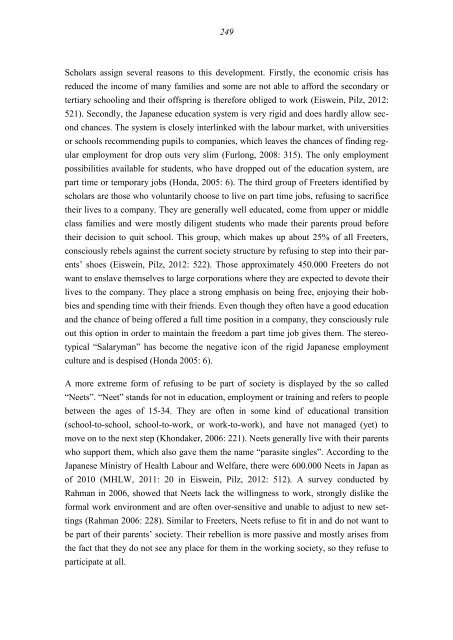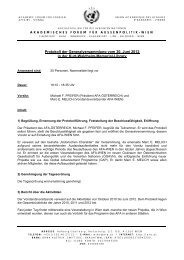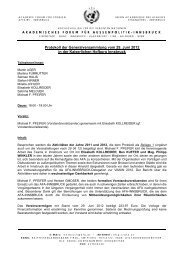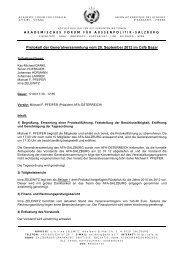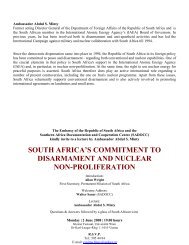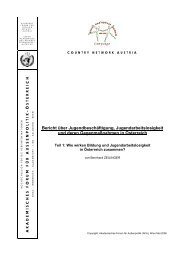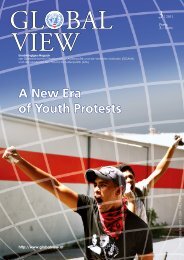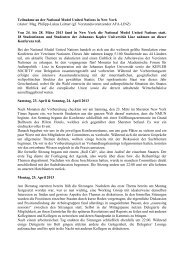GAP-JOURNAL 2012/13 - AFA
GAP-JOURNAL 2012/13 - AFA
GAP-JOURNAL 2012/13 - AFA
Erfolgreiche ePaper selbst erstellen
Machen Sie aus Ihren PDF Publikationen ein blätterbares Flipbook mit unserer einzigartigen Google optimierten e-Paper Software.
249<br />
Scholars assign several reasons to this development. Firstly, the economic crisis has<br />
reduced the income ofmany families and some are not able to afford the secondary or<br />
tertiary schooling and their offspring istherefore obliged to work (Eiswein, Pilz, <strong>2012</strong>:<br />
521). Secondly, the Japanese education system isvery rigid and does hardly allow second<br />
chances. The system is closely interlinked with the labour market, with universities<br />
or schools recommending pupils to companies, which leaves the chances of finding regular<br />
employment for drop outs very slim (Furlong, 2008: 315). The only employment<br />
possibilities available for students, who have dropped out of the education system, are<br />
part time or temporary jobs (Honda, 2005: 6). The third group of Freeters identified by<br />
scholars are those who voluntarily choose to live onpart time jobs, refusing to sacrifice<br />
their lives to acompany. They are generally well educated, come from upper ormiddle<br />
class families and were mostly diligent students who made their parents proud before<br />
their decision to quit school. This group, which makes up about 25% of all Freeters,<br />
consciously rebels against the current society structure byrefusing to step into their parents’<br />
shoes (Eiswein, Pilz, <strong>2012</strong>: 522). Those approximately 450.000 Freeters donot<br />
want to enslavethemselves tolarge corporations where they are expected to devotetheir<br />
lives to the company. They place astrong emphasis onbeing free, enjoying their hobbies<br />
and spending time with theirfriends. Even though theyoften have agood education<br />
and the chance of being offered afull time position inacompany, they consciously rule<br />
out this option inorder to maintain the freedom apart time job gives them. The stereotypical<br />
“Salaryman” has become the negative icon ofthe rigid Japanese employment<br />
culture and isdespised (Honda 2005: 6).<br />
Amore extreme form ofrefusing to be part of society is displayed by the socalled<br />
“Neets”. “Neet” stands fornot in education, employment or training and refers to people<br />
between the ages of15-34. They are often insome kind ofeducational transition<br />
(school-to-school, school-to-work, orwork-to-work), and have not managed (yet) to<br />
move on to thenext step (Khondaker, 2006: 221). Neets generally livewith theirparents<br />
who support them, which also gave them the name “parasite singles”. According tothe<br />
Japanese Ministry of Health Labour and Welfare, there were 600.000 Neets inJapan as<br />
of 2010 (MHLW, 2011: 20 in Eiswein, Pilz, <strong>2012</strong>: 512). A survey conducted by<br />
Rahman in 2006, showed that Neets lack the willingness towork, strongly dislike the<br />
formal work environment and are often over-sensitive and unable toadjust tonew settings<br />
(Rahman 2006: 228). Similar toFreeters, Neets refuse to fit inand do not want to<br />
be part of their parents’ society. Their rebellion ismore passive and mostly arises from<br />
the fact that they do not see any place for them inthe working society, sothey refuse to<br />
participateatall.


